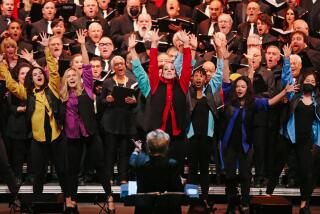Bulgarian Women’s Choir Pulls ‘Em In
- Share via
SAN DIEGO — At Minneapolis’ cathedral-like Basilica of St. Mary, fans tried to storm the doors in the time-honored rock ‘n’ roll fashion. The mild-mannered church ushers were stunned.
The reaction, after all, was to the Bulgarian State Female Vocal Choir, a Balkan troupe that performs folk music sung in six parts.
In 1987, the choir’s first U. S. release not only quickly transcended the limited circles of ivory tower ethnomusicologists, it went straight to the pop charts.
When Nonesuch Records released the women’s first recording, “Le Mystere des Voix Bulgares,” it remained on Billboard magazine’s Top 200 chart for three months.
“The British popular label 4AD issued the . . . recording of the Bulgarian women’s chorus early in 1987, and it was an immediate hit there,” said Carol Yaple of Nonesuch Records. “In fact, it became a cult record in Great Britain.”
According to Yaple, retired Swiss businessman Marcel Cellier, who studied Balkan music as an avocation, had made the original tapes of the chorus.
“When we released the recording here, we had no idea how it would do on the American market,” Yaple said, “but it quickly outpaced the British recording, which was a flash in the pan by comparison.”
The highly disciplined Bulgarian women made their inaugural North American tour in 1988, visiting 15 cities and garnering reviews that press agents would kill for.
The likes of pop icons Graham Nash and Linda Ronstadt offered lavish testimonials to the choir’s unique musicianship. Jerry Garcia of the Grateful Dead compared them to singing angels and said their music had influenced his group’s song “Uncle John’s Band.”
At 8 p.m. Thursday, the Bulgarian State Female Vocal Choir makes its San Diego debut in Symphony Hall. Under the leadership of music director Dora Hristova, the chorus begins its 25-city tour tonight in Pasadena and will end its continental journey at Boston’s Symphony Hall on May 5.
The popular response to the chorus on its 1988 tour surprised its typically staid sponsors, and Yaple attributes its appeal to several factors:
“First of all, they have an incredible vocal technique, an open-throated sound without any vibrato that is unique. This incredibly exotic, piercing sound that reaches you on a gut level is one you don’t easily forget. Also, the musical arrangements done by contemporary Bulgarian composers are artfully made. It may be folk music, but it’s more than just a single voice singing a simple tune.”
Like the traditional music of Soviet Georgia, which the Rustavi men’s choir recently brought to Symphony Hall, this Balkan music originated outdoors in ritual chores such as harvesting and shepherding. That accounts for the strong vocal techniques these cultures cultivated, a carrying power that many a Western opera singer might envy.
According to American composer Ingram Marshall, the tunes and singing style were also influenced by Asian musical traditions the Bulgarians absorbed during their 500-year domination by the Ottoman
Turks. Marshall noted that the technique of diaphonic singing, in which voices sustain long chords on what Western ears call dissonant intervals, reinforces the vibrant carrying power of the Bulgarian singers.
Although diaphonic singing may have been typical in other parts of Europe in medieval times, the development of Western art music and the influence of the Catholic Church worked against the survival of this vocal tradition. The use of asymmetrical meters is another musical trait that distinguishes this tradition from Western choral music.
That music should have an important social and cultural role in Bulgaria is not surprising to students of Greek mythology. Thrace, which is one of the main provinces of modern Bulgaria, is the birthplace of the legendary Orpheus, the father of Western music.
More to Read
The biggest entertainment stories
Get our big stories about Hollywood, film, television, music, arts, culture and more right in your inbox as soon as they publish.
You may occasionally receive promotional content from the Los Angeles Times.










